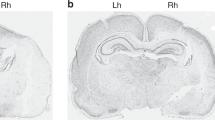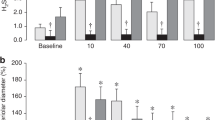Abstract
Status epilepticus is common in infants and may have long-term consequences on the brain persisting into adulthood. Vascular ischemia is a common cause of stroke in adulthood. The extent of stroke in 15-day-old rats is larger when previously exposed to kainic acid-induced status epilepticus. In this paper, we assess whether shortening the duration of seizures modifies subsequent susceptibility to middle cerebral artery occlusion. We administered pentobarbital 50 mg/kg to abort seizures after 1 h. Although administration of pentobarbital aborted seizures, it had no effect on volume of infarction following ischemia. This study indicates that there is dissociation between stopping status epilepticus and modifying its long-term consequences.

Similar content being viewed by others
References
Koh S, Storey TW, Santos TC, Mian AY, Cole AJ (1999) Early-life seizures in rats increase susceptibility to seizure-induced brain injury in adulthood. Neurology 53:915–921
Hauser WA, Rich SS, Annegers JF, Anderson VE (1990) Seizure recurrence after a 1st unprovoked seizure: an extended follow-up. Neurology 40:1163–1170
Shinnar S, Pellock JM, Moshe SL, Maytal J, O’Dell C, Driscoll SM et al (1997) In whom does status epilepticus occur: age-related differences in children. Epilepsia 38:907–914
Feigin VL (2005) Stroke epidemiology in the developing world. Lancet 365:2160–2161
Haut SR, Veliskova J, Moshe SL (2004) Susceptibility of immature and adult brains to seizure effects. Lancet Neurol 3:608–617
Giorgi FS, Malhotra S, Hasson H, Velísková J, Rosenbaum D, Moshé SL (2005) Effects of status epilepticus early in life on susceptibility to ischemic injury in adulthood. Epilepsia 46:490–498
Hasson H, Kim M, Moshe SL (2008) Effective treatments of prolonged status epilepticus in developing rats. Epilepsy Behav 13:62–69
Velisek L, Moshe SL (2002) Effects of brief seizures during development. Prog Brain Res 135:355–364
Acknowledgments
Dr. Hasson is an NSADA trainee supported by K12 NS048856. Supported by RO1 NS20253 from NINDS and the Heffer Family Foundation. S.L.M. is a recipient of a Martin A. and Emily L. Fischer Fellowship in Neurology and Pediatrics.
Conflict of interest statement
None of the coauthors have any financial disclosures to disclose.
Author information
Authors and Affiliations
Corresponding author
Rights and permissions
About this article
Cite this article
Hasson, H., Malhotra, S., Giorgi, F.S. et al. Harmful effect of kainic acid on brain ischemic damage is not related to duration of status epilepticus. Neurol Sci 31, 103–105 (2010). https://doi.org/10.1007/s10072-009-0115-x
Received:
Accepted:
Published:
Issue Date:
DOI: https://doi.org/10.1007/s10072-009-0115-x




